Canada’s Consumer Privacy Protection Act – An Ultimate Guide
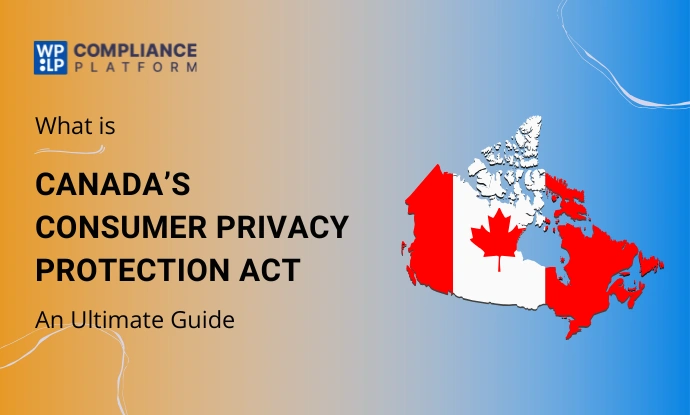
Summary
The act applies to all private-sector organizations that handle, store, and share data of Canadians, including foreign companies. Not complying with CPPA leads to severe penalties, with fines reaching up to the greater of $25 million CAD or 5% of a company’s gross global revenue.
With the WPLP Compliance Platform, any business can stay compliant with CPPA using privacy policies and cookie consent templates that are updated regularly with the ongoing changes in regulations.
Are you collecting or processing personal data in Canada?
If the answer is yes, then you must comply with Canada’s Consumer Privacy Protection Act, or you may face heavy penalties.
Canada has taken strong measures to strengthen consumer data rights with the introduction of the Consumer Privacy Protection Act (CPPA). This Act aims to give consumers complete control over their data and promote transparency regarding the use of their personal data by organisations.
So if you’re a website owner, manage consumer data, or offer any digital solutions in Canada, this Act directly affects you, and non-compliance would mean heavy losses.
In this ultimate guide, we have broken down every little detail you need to know about Canada’s Consumer Privacy Protection Act. So come read along!
- What is Canada’s Consumer Privacy Protection Act?
- Who Must Comply With Canada’s Consumer Privacy Protection Act (CPPA)?
- What are the Consumer Rights Under the Canada Consumer Privacy Protection Act
- How Can Businesses Achieve Compliance with Canada’s CPPA?
- Canada’s CPPA Penalties and Fines for Non-Compliance
- FAQ
- Conclusion
What is Canada’s Consumer Privacy Protection Act?
So what exactly is Canada’s Consumer Privacy Protection Act?
Canada’s Consumer Privacy Protection Act is a federal law. It focus is mainly on the consumers’ data privacy rights in terms of how the data is collected, used, and disclosed for commercial purposes. Additionally, it also specifies the process for responding to data deletion, access, and correction requests.
The CPPA is an update to Canada’s existing Personal Information Protection and Electronic Documents Act (PIPEDA). While PIPEDA involves personal information collected, used, or disclosed by private sector organizations, CPPA has a more targeted scope. It centres mainly around consumer privacy rights and the collection and use of data for e-commerce or online activity.
Additionally, CPPA seeks to bring Canada’s data privacy standards in line with the global standards, such as Europe’s General Data Protection Regulation (GDPR).
Some of the key components of the act include:
- Obtaining clear consent: CPPA emphasises the need to obtain a clear, informed, and explicit consent from individuals before collecting and storing their personal data.
- Transparency in Algorithms: It introduced additional transparency requirements and disclaimers for organizations using Artificial Intelligence and Algorithms. Organisations should inform individuals about the use of AI or algorithms in creating predictions or recommendations based on the individual’s personal data.
- Data Portability: An individual has complete control over the transfer of their data from one organisation to another and has the right to have their information deleted.
- Global Application: Canada’s Consumer Privacy Law states that it covers personal information collected, used, or disclosed across international borders.
Who Must Comply With Canada’s Consumer Privacy Protection Act (CPPA)?
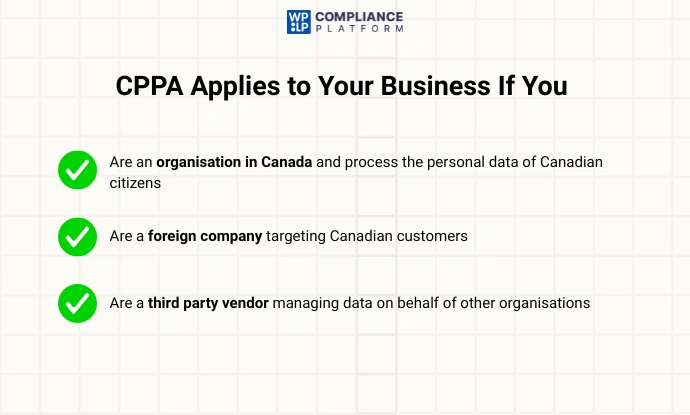
The CPPA applies to a wide range of organisations based on the type of data collected. It is applicable to any organisation collecting, processing, or disclosing an individual’s personal data.
It applies to:
- Any organisation operating in Canada that manages personal data for commercial benefit.
- Foreign companies targeting Canadian customers (websites, apps, and eCommerce sites) are expected to comply with the CPPA requirements.
- Additionally, third-party vendors managing data on behalf of other organisations must also comply with the CPPA rules.
In a nutshell, the aim of Canada’s Privacy Policy Act is to create an extensive and fresh framework for privacy. If your organisation handles data of Canadian individuals for any commercial pursuit, CPPA applies to you. You must take steps to comply with the regulations or be prepared to face penalties and fines.
What are the Consumer Rights Under the Canada Consumer Privacy Protection Act
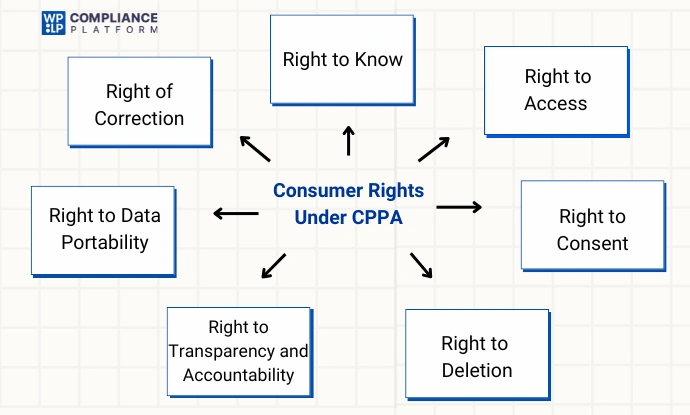
Canada’s Consumer Privacy Protection Act(CPPA) enables individuals to gain control over the usage of their personal data. Whether you’re making online purchases, scrolling through social media, or signing up for a newsletter, individuals have a greater influence over how organisations use their data.
The rights that consumers have under CPPA are:
1. Right to Know
Organisations must now inform their customers about how, where, and why they utilize, store, or share their data. Organizations must inform consumers about this through a notice or a privacy policy.
2. Right to Access
Individuals can request organisations to see what data they have about them or how it is utilised, stored, or shared. Organisations must get back to the customers about this within a reasonable time, with proper details.
3. Right to Consent
Under the CPPA, organisations must collect valid consent from individuals before beginning to collect their data. This usually means:
- Consent must be easy to withdraw, and
- Clear opt-in and opt-out methods.
4. Right to Deletion
Consumers can request organisations to delete their data, and the organisation must comply. Consumers can do so if they opt out or withdraw consent.
5. Right to Data Portability
Consumers can request organisations to transfer their data from one organisation to another organisation or a service provider.
6. Right to transparency and accountability
Individuals have the right to know how organisations use their data and manage data risks, implement safeguards, and maintain accountability. You need to provide your customers with the necessary details within a reasonable timeframe.
7. Right to Correction
If an individual’s information is incorrect or incomplete, they have the right to ask the organisation to correct the wrong information or add the missing data. The organization must comply with this.
How Can Businesses Achieve Compliance with Canada’s CPPA?
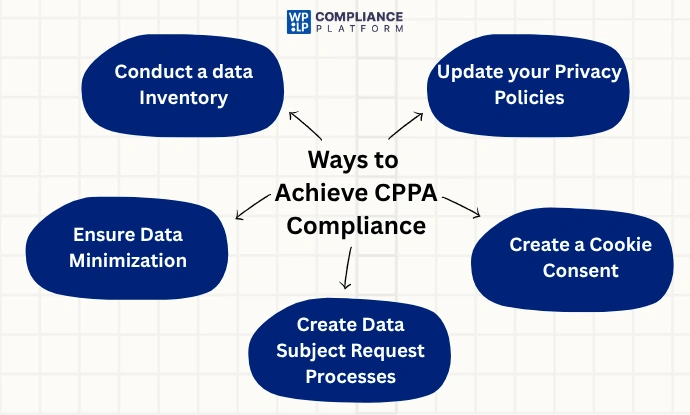
Achieving compliance with Canada’s Privacy Protection Act does not just limit to updating your privacy policy; it also means being proactive and changing the way your organisation handles data.
Some of the steps you could take to achieve compliance with the CPPA requirements are:
- Conduct a data inventory: Map out where and how you are collecting customers’ data and how it is used, which helps you identify all the relevant data you have stored.
- Update your Privacy Policies: You must ensure that your privacy policy is up-to-date, clear, and concise. It should convey a clear message to users to understand where their data is being collected and how they can exercise their rights.
- Create a Cookie Consent: To begin with, create a cookie consent policy or update your existing one, so that Canadian users are aware of the cookies you use and how they can exercise their rights to opt out or in, whenever they please. A cookie consent banner allows individuals to choose whether websites collect their personal data through cookies, specifically for tracking and personalization.
- Create Data Subject Request Processes: You must provide a straightforward and efficient way for individuals to request access, correct, or delete their personal data whenever they want.
- Ensure data minimisation: You must make sure to collect only the information that is absolutely necessary for the functioning of actions on your website, app, and so on.
How does the WPLP Compliance Platform Come into the Picture?
For business, specifically using WordPress, complying with all of these becomes a challenging task. That’s where the WPLP Compliance Platform WordPress Plugin comes into the picture. It is a consent management platform that simplifies most of the key compliance tasks.
1. Generate Legal Pages
Organizations that collect users’ data are required to have a clear privacy policy or legal pages set up on their website to stay compliant.
To help you create legal pages for your website, you can use the WPLP Compliance Platform privacy policy generator.
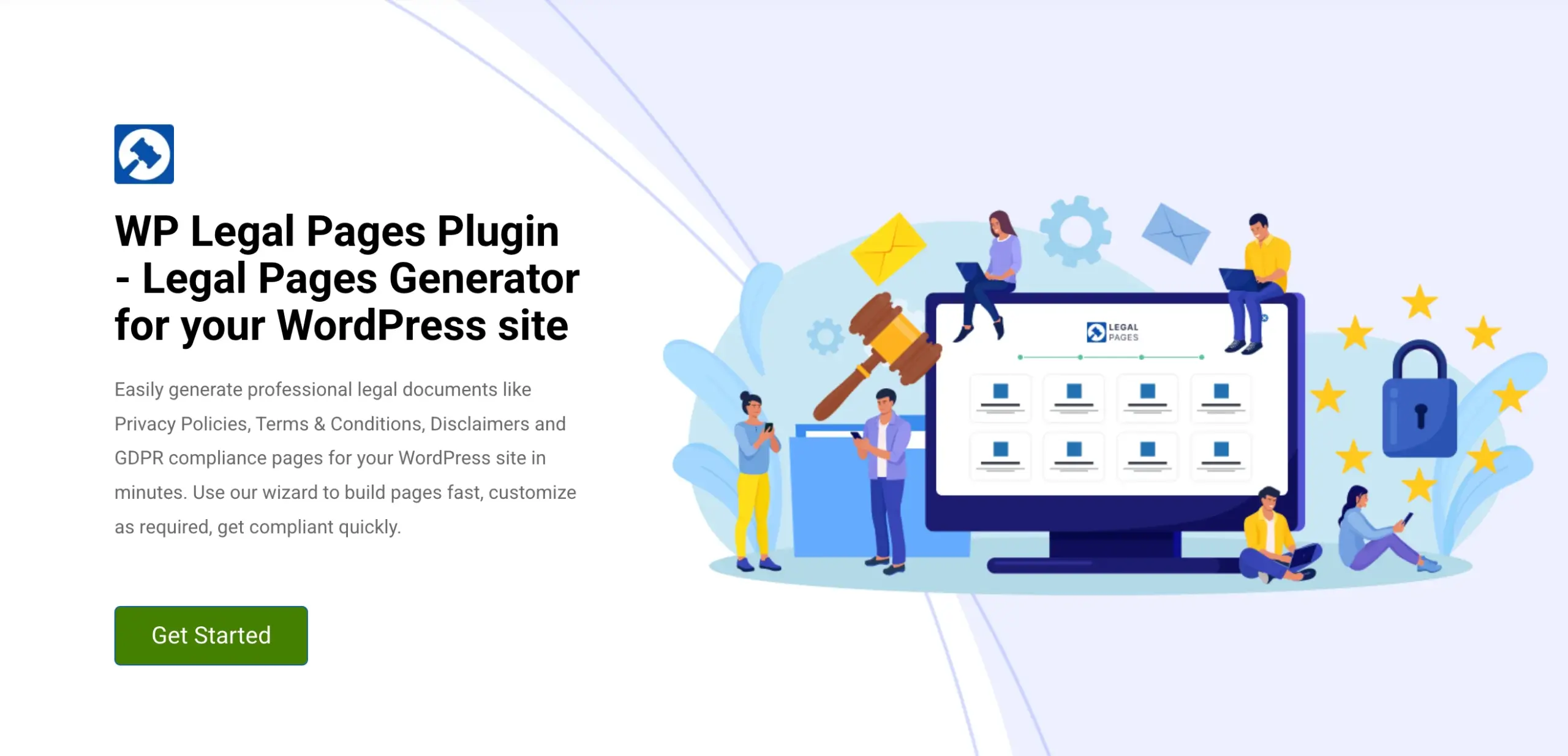
It offers 30+ pre-built legal templates such as Privacy Policy, Disclaimer, Terms and Conditions, and many more. They are specifically crafted as per various laws and regulations, so that you can generate legal pages within a few minutes.
It features a guided wizard that guides you through the entire process by answering a few simple questions about your website.
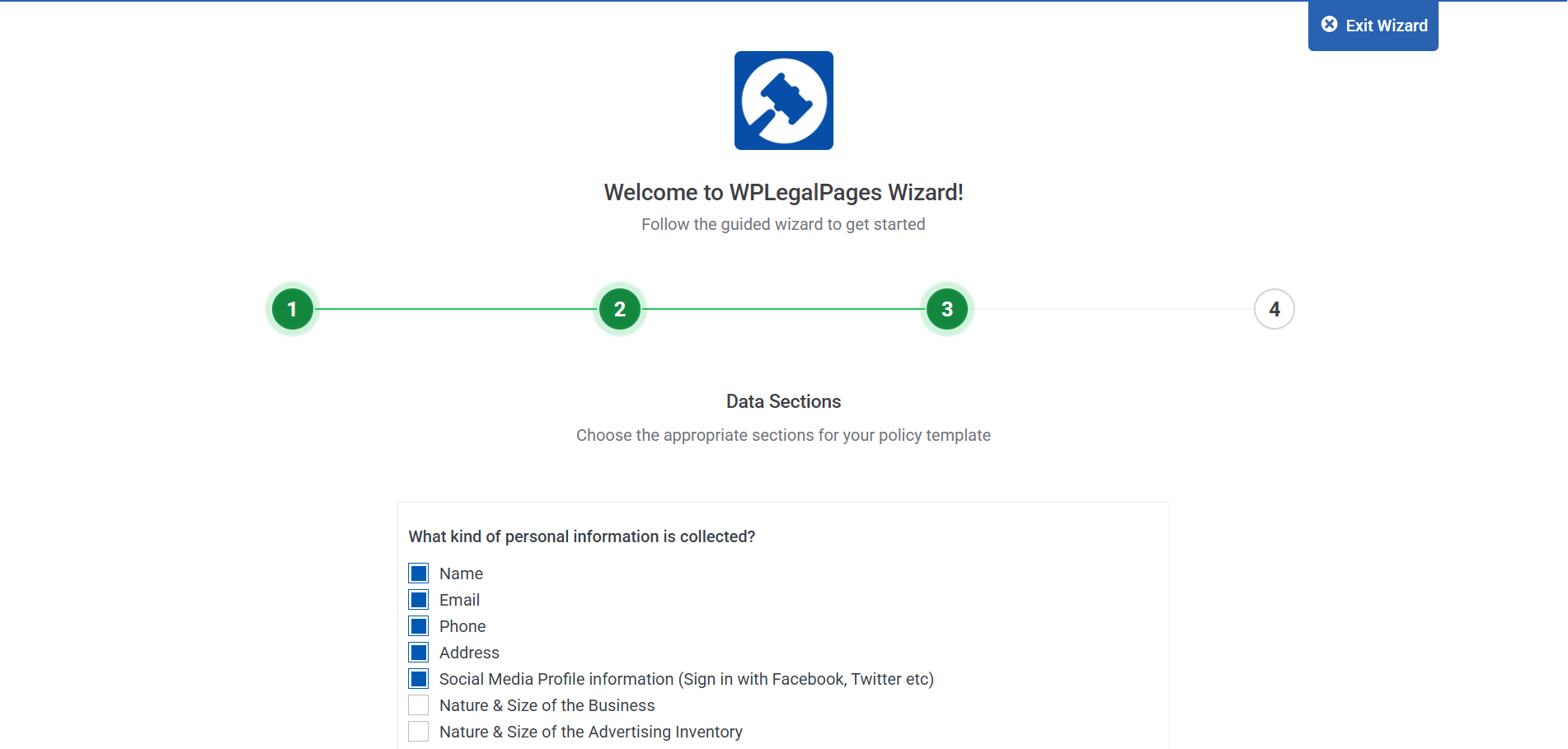
WPLP Compliance Platform is an all-in-one solution to comply with cyber laws. And guess what, you don’t even need a lawyer to begin with!
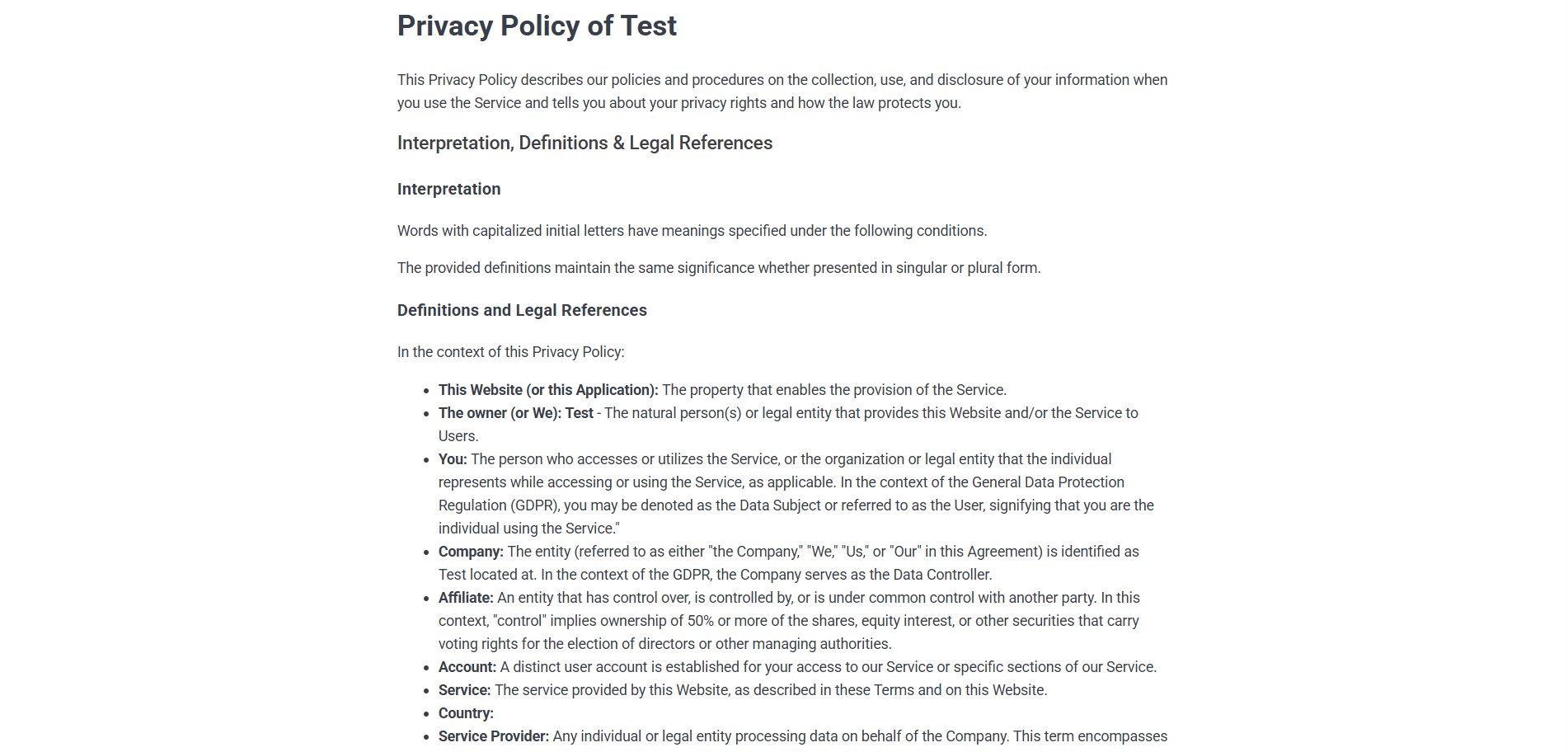
This Privacy Policy is generated keeping Canada’s Consumer Privacy Protection Act. You can use the WPLP Compliance Platform as well to generate one for your website.
2. User Consent Using Cookie Banners
Under Canada’s Consumer Privacy Protection Act, user consent is required to be acquired before collecting data.
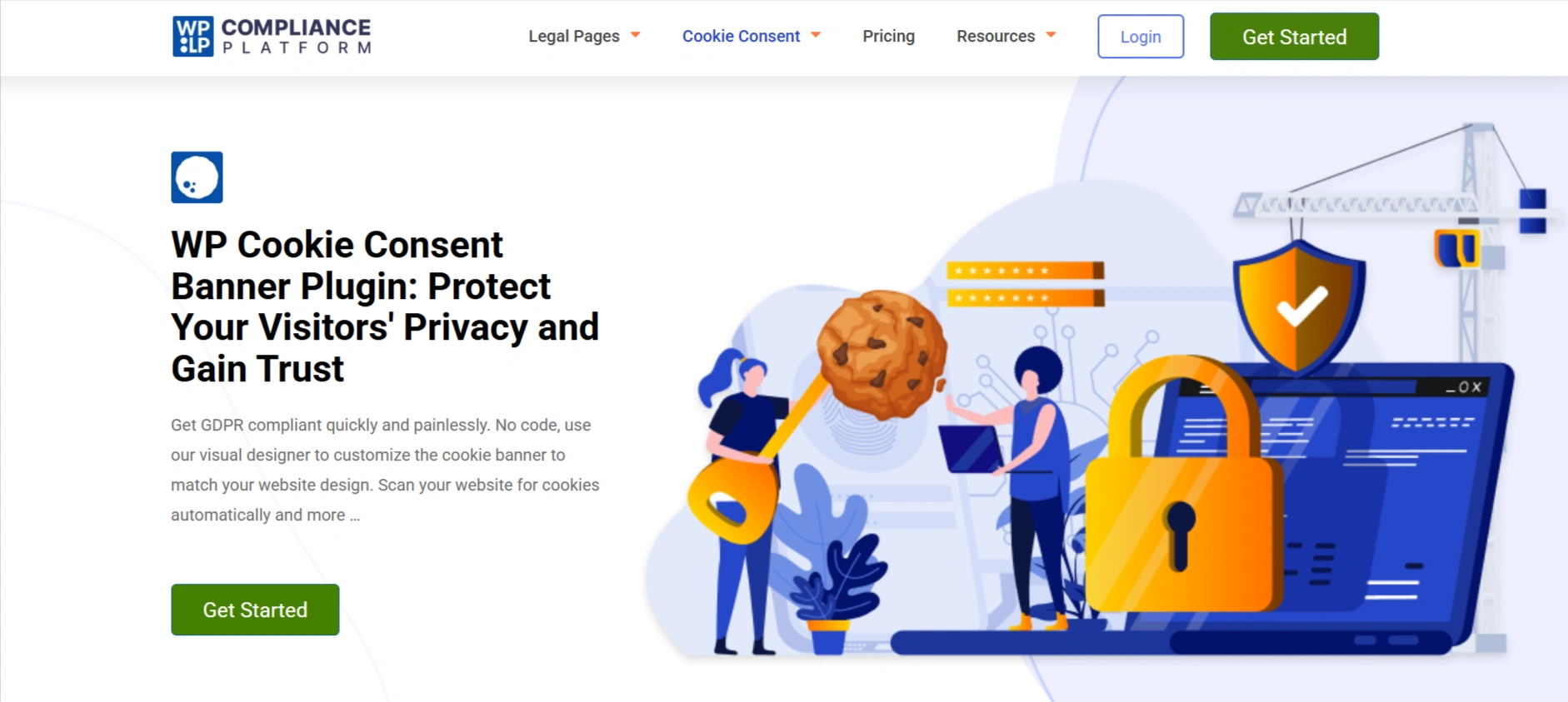
You can add a cookie consent banner or a cookie pop-up to your website using the Cookie Consent Management feature in the WPLP Compliance Platform Plugin. It is a one-stop platform for all your privacy compliance, helping you generate legal policies in minutes.
You can choose from nine fully customisable cookie consent templates according to your needs, in the form of cookie consent banners, pop-ups, or inline notices.
Additionally, it is loaded with features such as cookie categorisation, consent audits, support for Google Consent Mode v2, and geo-targeted banners. It is also IAB TCF 2.2 compliant to promote transparency and avoid penalties.
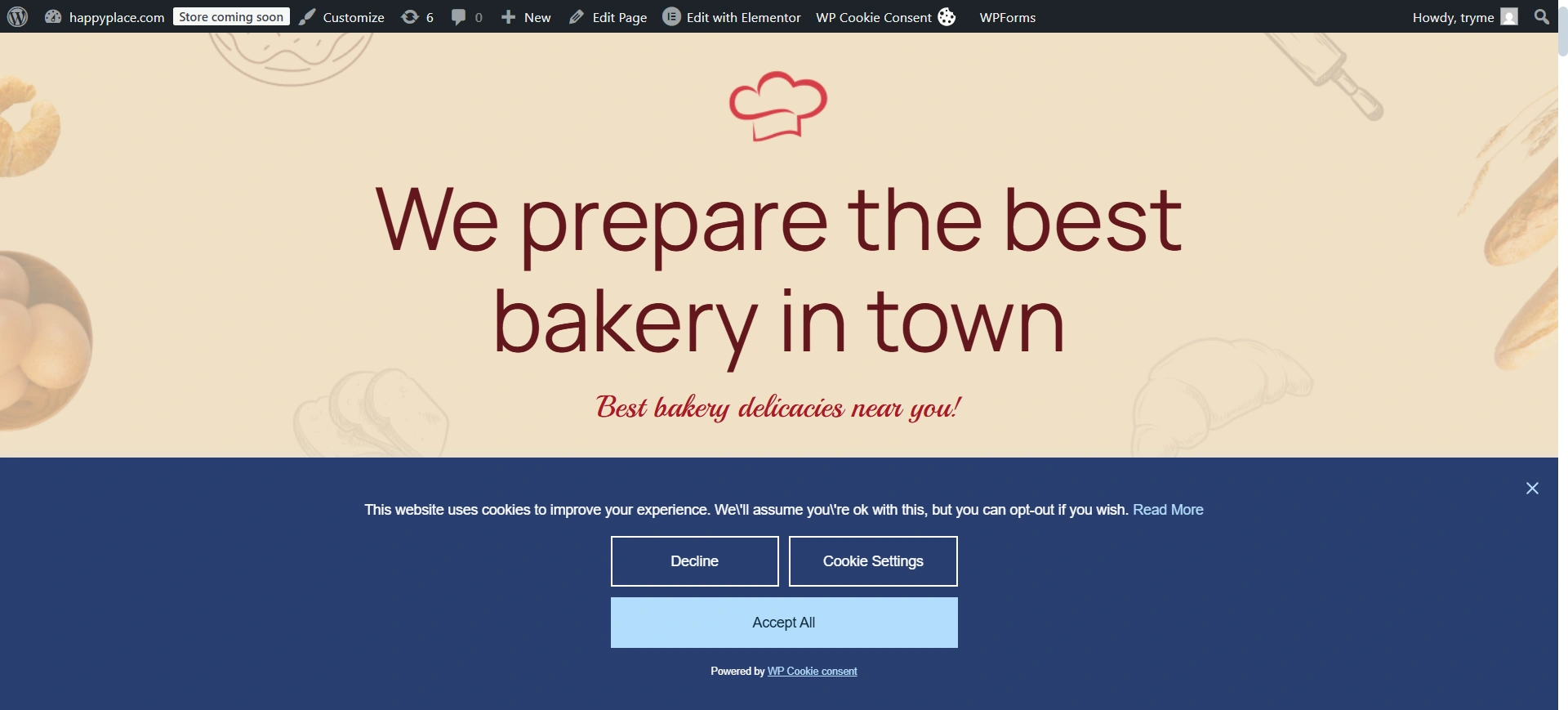
This cookie banner is generated keeping Canada’s Consumer Privacy Protection Act. You can use the WPLP Compliance Platform as well to generate one for your website.
The Cookie Banner you add to your website would look like this. You can easily customise the colours and the layout according to your preference.
3. Generating CPPA-Compliant Legal Policies
The WPLP Compliance Platform can create a privacy policy that echoes CPPA requirements, including how personal data is collected, stored, used, and shared.
It enables you to clearly communicate data retention, correction rights, and consent mechanisms using the Terms of Service or Data Retention policies to users as required under the CPPA.
4. Managing Consent in Line with CPPA Requirements
- Cookie Consent Banner: Although CPPA focuses on broader personal information, consent is still key. WPLP’s customizable banners can capture, store, and demonstrate consent in a compliant way.
- Granular Consent Options: It allows users to give specific consent for different purposes, such as analytics, marketing, and advertising, in line with CPPA’s “valid consent” criteria.
5. Proof of Compliance (Audit & Logging)
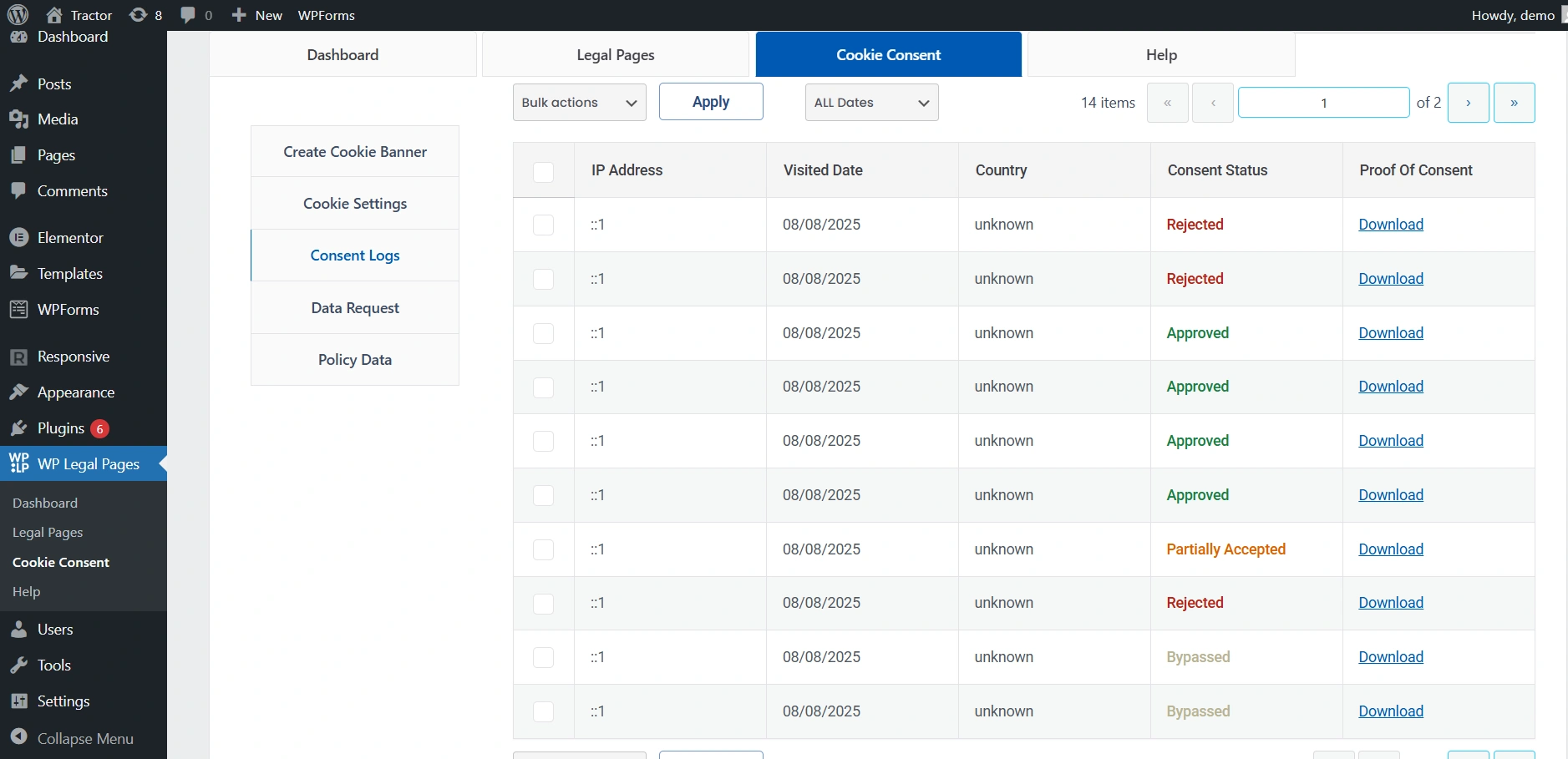
- Consent Logs: WPLP enables website owners to store consent records with timestamps (who gave consent, when, for what purpose) so that the site owners can prove compliance during audits.
- Cookie Scanning Reports: It enables the identification and classification of cookies, which helps businesses understand what is being tracked on their site and document it for compliance purposes.
6. Supporting User Rights under CPPA
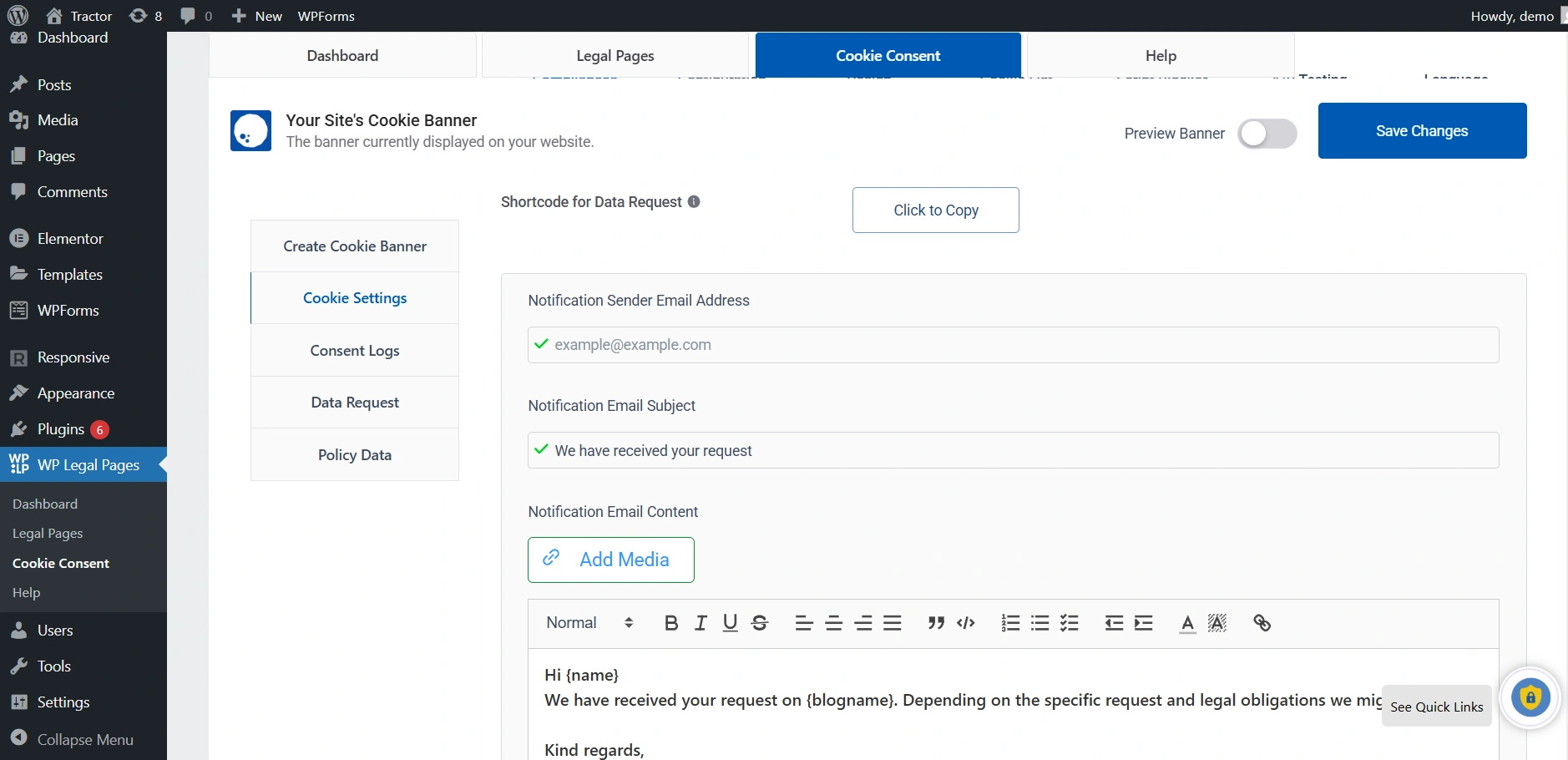
- DSAR Forms (Data Subject Access Request): Using the WPLP Compliance Platform, users can easily request to access, correct, or delete their personal data.
- Withdrawal of Consent: WPLP’s “Revoke Consent” option ensures users can easily withdraw consent, as required under CPPA.
7. Adapting for Multi-Jurisdictional Compliance
Many Canadian businesses serve global users. WPLP Compliance Platform supports GDPR, CCPA, LGPD, PIPEDA, and now CPPA compliance, allowing businesses to meet multiple regulations in one setup.
No lawyer or law firm is required to start out. Just install the plugin, with the help of the guided wizard, answer a few questions, and you’re good to go.
Canada’s CPPA Penalties and Fines for Non-Compliance
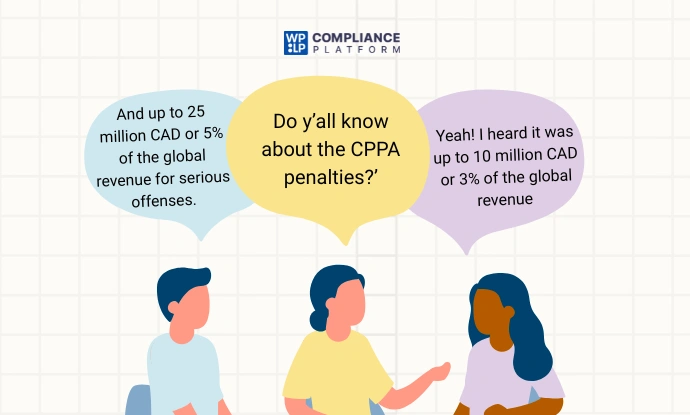
The CPPA has introduced some of the most stringent penalties for non-compliance with the Consumer Privacy Protection Act. They are specially curated to be a significant hurdle if an organisation is non-compliant.
Administrative monetary penalties could be ordered for up to the greater of $10 million CAD or 3% of an organization’s gross global revenue in the prior fiscal year.
For serious offenses, such as failing to report a data breach or obstructing an investigation, a fine greater than $25 million CAD or 5% of an organization’s gross global revenue could be charged.
Individuals also have the right to sue organisations for damage under the CPPA if authorities find a violation of the act.
A combination of these severe penalties makes CPPA one of the most rigid privacy laws in the world, just adjacent to other strong privacy laws such as the General Data Protection Regulation (GDPR) and California Consumer Privacy Act (CCPA).
FAQ
Canada’s Consumer Privacy Protection Act (CPPA) is a federal law designed to give consumers more control over the use of their personal information and to set clear standards for how businesses collect, use, and share this data. Not complying with CPPA might result in heavy penalties.
The Canada CPPA applies to any private sector business that collects, stores, and discloses a consumer’s data for commercial benefit. This includes Canadian businesses, foreign companies in trade with Canada, or any third-party vendors, managing data on behalf of other organizations (such as hosting, analytics, or marketing).
Canada’s Consumer Privacy Protection Act enforces strict penalties for non-compliance, where fines reach up to $10 Million CAD or 3% of a company’s gross global revenue. Moreover, individuals also have the right to sue the company for damages. The WPLP Compliance Platform offers solutions to avoid these hefty penalties for non-compliance. It is a one-stop platform for all your privacy compliance needs.
Businesses can comply with the CPPA by setting clear privacy policies and getting user consent before collecting data. They must ensure that transparency and trust are maintained with their customers. Consent withdrawal and opt-outs are also supposed to be facilitated by the businesses. The WPLP Compliance Platform is an all-in-one solution to comply with privacy laws. It gives you access to multiple templates for legal pages and cookie consent, and helps you generate legal it in just a few minutes. Plus, the best part, you don’t even have to hire a lawyer to start out!
Conclusion
Canada’s Consumer Privacy Protection Act is a key step towards protecting consumer privacy in this digital age. If you collect, store, and disclose users’ personal information, you must be prepared to comply with this stringent act or ultimately face hefty penalties.
Organisations should update their policies, understand their legal obligations much better, and start developing best practices for data governance to avoid fines.
We highly recommend using the WPLP Compliance Platform to generate privacy policies, consent banners, and more, right inside WordPress, to begin meeting the Canada Consumer Privacy Protection Act.
Disclaimer: This article provides general information and should not be considered legal advice. Privacy laws are complex and subject to change. For full compliance and advice specific to your situation, please consult a qualified legal professional.
Furthermore, if you liked reading this blog, you can also consider reading:
- Connecticut Data Privacy Act (CTDPA) – A Complete Overview
- Montana Consumer Data Privacy Act (MCDPA) – How To Comply?
- Michigan Personal Data Privacy Act – How to Comply
Need help complying with CPPA? Simplify the process with the WPLP Compliance Platform.
